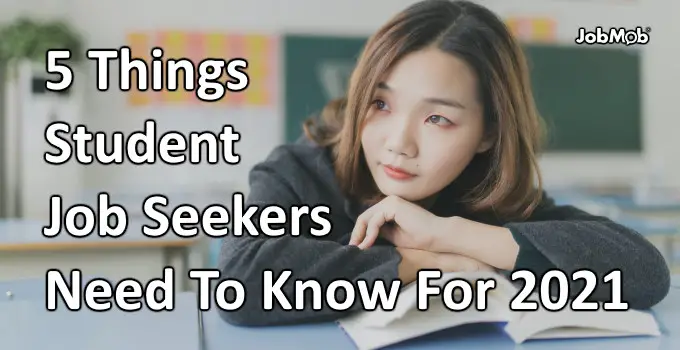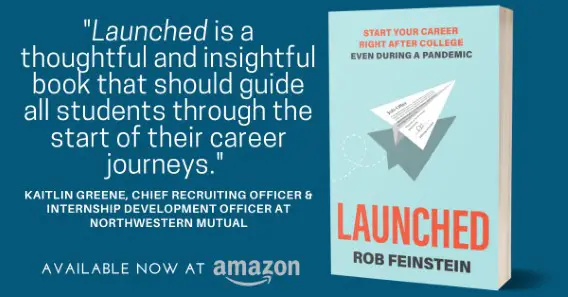Preparing for your first career job search? Here's how to adapt for a recruiting year like none before.

This is a guest post by Rob Feinstein.
For college students planning their transition to the full-time working world, 2020 was a year of learning the new rules of the game on the fly.
Looking for work, and life on the job, radically changed in real time. Internships and jobs turned virtual, if they remained at all. Everything related to work – from interviews to the day-to-day life of ‘office’ work – happened remotely.
But for 2021, it will be expected that we’ve all adjusted to a new normal. Student job seekers will need to be experts at the keys to getting a job and thriving in it in a world of remote interviewing and remote work.
Here are the top five things that student job seekers will need to know for 2021.
What college students need to know about job search right now
1) Master the video interview
Your job interview will be on Zoom, or another popular video interview platform, so you need to get comfortable and learn to shine in that medium.
Here are the keys:
- Practice. Give yourself a typical interview prompt like “Tell me about yourself” and record yourself on Zoom to see how you look and sound on video. It’s humbling at first, but you’ll easily see what you need to improve. Record, review, repeat.
- Know where to look. The age-old advice for interviews used to be ‘give a firm handshake and look them in the eye’. In a video interview, the next best thing is to know where to look to appear to make eye contact. There’s a simple trick for this that I share in my new book titled “Launched – Start your career right after college, even during a pandemic”: look at the green light on your laptop, which is the camera’s eye, and your interviewers will see it as looking straight at them. Otherwise, you’ll look like you’re oddly staring away.
- Clean up. That’s not just about what you wear, but what’s in the background that the camera shows. Pick a well-lit and well-kept area of your home to create a clean backdrop that won’t distract your interviewer.
- Sit up straight. You need to sit, but you also need to maintain high energy. Sit at the edge of your seat, and lean in, to appear engaged in the conversation. That’s the remote interview equivalent of a firm handshake.
Note: There is a poll embedded within this post, please visit the site to participate in this post's poll.
2) Build your network
It’s never been more important to nurture your business network as an aid to your job search.
Did you know that the average LinkedIn user has 400 contacts? That means that if you have an average number of LinkedIn contacts, the number of people your contacts know is 160,000 people! That’s 160,000 possibilities that you are one introduction away from a contact at a company where you’d love to work, an industry you want to explore, or someone you can meet for an informational interview (virtually, of course).
Grow your network on LinkedIn, starting today. Send invitations to connect to former colleagues, execs where you’ve worked who you met (even briefly), your friends, and also your friends’ parents who work in fields you’re targeting. Perhaps even make a local networking directory.
Your network is a lifelong asset that you’ll continue to build throughout your career.
3) Multidimensional applying
One of the great values of your professional network is how it can come into play when you’ve applied for a job. You don’t want to just send in your resume and hope for the best. Instead, you want to be proactive and use a tactic I call multidimensional applying. That means that sending in your resume and cover letter is just your opening gambit. What you do next is look to your network to identify who you know, or who your contacts know, who can help you get that job by:
- Putting in a good word for you with the hiring manager;
- Providing an insider’s view of the company;
- And giving you research tidbits to win the interview.
4) Non-standard resume additions
There are two items that you’d never thought should make their way onto your resume, but in 2021 they should.
Who would have thought you should put a job on your resume that you never started?
In the COVID era, it’s actually a good idea for your resume to include experiences you didn’t get to have due to the pandemic. The National Association of Colleges and Employers suggests adding a line like this to your resume: “XYZ Company – Internship offer accepted. Rescinded due to COVID-19 – Summer 2020.” The same is true to a job you started but lost due to the pandemic.
The other items to emphasize on your resume are your proven abilities to master the skills of remote working. I’m talking about things like experience working from home, comfort with remote work tools like video conferencing, and ability to teach yourself new things on your own. Employers now understand that a new set of skills are more critical in an era of remote work, and they’re on the lookout for candidates who have a better-than-average chance to succeed as a new employee starting from home from Day One.
5) Self Improvement
The number-one job interview question of the upcoming recruiting season is easy to predict. It will be: “how did you spend your time during COVID?’. Every answer, whether you were employed or not, should include something about how you improved yourself.
- What did you read?
- What volunteer work did you do?
- What courses did you take?
Basically, it’s this: what did you do to stay productive and be better when the world had turned upside down?
Many great online courses are free on sites like Udemy, and your school may have a deal with a program like LinkedIn Learning that’s normally fee-based.
The coming year of 2021 will be a recruiting year like none we’ve experienced in our lifetimes. We’ll either still be in a pandemic, or pulling out of it. Either way, along with what’s certain to be a time of continued challenges to the economy, students entering the job market will need to be experts in a new set of skills to be among those who rise to the challenge and succeed.
Question of the article
What has a friend done on a recent job search that you never would have thought of? Tell us in the comments.
READ NEXT:  Where To Quickly Find Virtual Remote Internships That Rock
Where To Quickly Find Virtual Remote Internships That Rock
About the Author
![]() Rob Feinstein is a pioneer in the online recruiting industry, a longtime software industry executive, an award-winning former journalist and career coach. He is the author of “Launched – Start your career right after college, even during a pandemic”.
Rob Feinstein is a pioneer in the online recruiting industry, a longtime software industry executive, an award-winning former journalist and career coach. He is the author of “Launched – Start your career right after college, even during a pandemic”.
Subscribe to JobMob via email and follow me on Twitter for more of the best job search advice students can get for 2021.
The post 👩🎓 5 Things Student Job Seekers Need To Know For 2021 first appeared on JobMob.
via JobMob More Information Here..



Headhunter In Thailand | Executive Recruitment Agencies | Outplacement Bangkok | Head Hunter Recruitment Thailand
ReplyDeleteThank you, I appreciate that I getting a lot of good and reliable information from your post. Thanks for sharing such kind of nice and wonderful post.